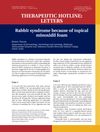 July 2021 in “Journal of Dermatology and Dermatologic Surgery”
July 2021 in “Journal of Dermatology and Dermatologic Surgery” There's a significant link between severe hair loss and metabolic syndrome in Saudi Arabia, suggesting early health checks could prevent future issues.
 5 citations,
February 2023 in “Journal of Clinical Medicine”
5 citations,
February 2023 in “Journal of Clinical Medicine” Diagnosing and treating PCOS in teenagers is difficult, and the focus is on lifestyle changes and medication to improve health and prevent future issues.
 4 citations,
August 2017 in “The Nurse Practitioner”
4 citations,
August 2017 in “The Nurse Practitioner” Secondary amenorrhea has many causes and requires thorough evaluation to treat and restore menstrual cycles.
 21 citations,
December 2007 in “Primary Care”
21 citations,
December 2007 in “Primary Care” Early diagnosis and treatment of PCOS is crucial to reduce emotional distress and health risks.
 3 citations,
January 2012 in “Hanyang Medical Reviews”
3 citations,
January 2012 in “Hanyang Medical Reviews” The document concludes that more research is needed to create suitable diagnostic criteria and understand PCOS in Korean women, and genetics may allow for personalized treatment.
6 citations,
December 2015 in “Medicine” Cronkhite-Canada syndrome may be more treatable and less severe than previously thought.
 7 citations,
August 2017 in “European Journal of Obstetrics & Gynecology and Reproductive Biology”
7 citations,
August 2017 in “European Journal of Obstetrics & Gynecology and Reproductive Biology” Lower vaspin levels in the blood may indicate a better response to fertility treatment in women with PCOS.
 June 2016 in “International journal of recent surgical and medical science”
June 2016 in “International journal of recent surgical and medical science” Early balding in men is linked to metabolic syndrome, so screening is important for prevention.
 4 citations,
July 2021 in “Journal of Dermatological Treatment”
4 citations,
July 2021 in “Journal of Dermatological Treatment” Finasteride helps hair growth but may cause sexual side effects and depression.
 35 citations,
July 2015 in “Journal of Affective Disorders”
35 citations,
July 2015 in “Journal of Affective Disorders” Women with PCOS tend to have higher anxiety and depression levels compared to healthy women.
 92 citations,
May 2014 in “The American Journal of Medicine”
92 citations,
May 2014 in “The American Journal of Medicine” The conclusion is that early diagnosis and a multi-system treatment approach are crucial for managing PCOS and its associated health risks.
 February 2018 in “InTech eBooks”
February 2018 in “InTech eBooks” Diagnosing and treating PCOS is complex due to differing criteria and requires a team approach.
 February 2012 in “InTech eBooks”
February 2012 in “InTech eBooks” PCOS increases the risk of heart disease and type 2 diabetes in women.
61 citations,
April 1969 in “Archives of Dermatology” Skin biopsy is crucial for diagnosing unknown baldness causes.
 October 2018 in “International journal of reproduction, contraception, obstetrics and gynecology”
October 2018 in “International journal of reproduction, contraception, obstetrics and gynecology” Higher testosterone levels in Nigerian women with PCOS are linked to glucose disorders like diabetes.
 66 citations,
September 2008 in “Dermatologic therapy”
66 citations,
September 2008 in “Dermatologic therapy” The conclusion is that the best initial treatment for hirsutism is usually oral contraceptives, with the addition of antiandrogens or insulin sensitizers if needed, and topical eflornithine or laser treatments as supplementary options.
 2 citations,
March 2015 in “Dermatologic Therapy”
2 citations,
March 2015 in “Dermatologic Therapy” Using too much minoxidil foam can cause a rare movement disorder with facial twitching, but symptoms go away when the correct dose is used.
 February 2023 in “Malaysian Journal of Science. Series B, Physical & Earth Sciences”
February 2023 in “Malaysian Journal of Science. Series B, Physical & Earth Sciences” Analyzing bear poop helps measure their stress without harming them.
December 2018 in “Indian Journal of Paediatric Dermatology” Early-onset hair loss may be linked to higher risk of metabolic syndrome.
 11 citations,
February 2008 in “British journal of nursing”
11 citations,
February 2008 in “British journal of nursing” Idiopathic hirsutism causes excessive hair growth in women, can be treated with medication and hair removal, but cannot be fully reversed.
14 citations,
March 2014 in “Acta anaesthesiologica Taiwanica” A man developed rare complications after nose surgery, stressing the need for better prevention.
 75 citations,
November 2007 in “Clinical endocrinology”
75 citations,
November 2007 in “Clinical endocrinology” Certain medications including flutamide, spironolactone, and others effectively reduce excessive hair growth in women, especially when combined with lifestyle changes.
 June 2023 in “Journal of multidisciplinary sciences”
June 2023 in “Journal of multidisciplinary sciences” PCOS may increase the risk of certain cancers.
1 citations,
January 2022 in “Springer eBooks”  50 citations,
August 2017 in “Diabetologia”
50 citations,
August 2017 in “Diabetologia” Metformin has limited effectiveness for improving PCOS symptoms and lacks clear benefits, needing more research to confirm its efficacy.
 7 citations,
December 2016 in “British Journal of Dermatology”
7 citations,
December 2016 in “British Journal of Dermatology” The report suggests that hair loss in Cronkhite-Canada syndrome may be caused by alopecia areata incognita, as shown by a patient's improvement with treatment.
3 citations,
June 2018 in “Internal Medicine” Recombinant thrombomodulin can effectively treat severe complications in Cronkhite-Canada syndrome.
 December 2024 in “African Journal of Biomedical Research”
December 2024 in “African Journal of Biomedical Research” Combining lifestyle changes and medication is most effective for managing PCOS symptoms.

The conclusion is that a more comprehensive and precise approach is needed for diagnosing PCOS to address its broader health risks.
 21 citations,
January 2003 in “Seminars in reproductive medicine”
21 citations,
January 2003 in “Seminars in reproductive medicine” The document concludes that various drugs can manage symptoms and metabolic issues in women with PCOS.























